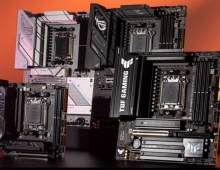
Intel Ships its Next-Generation WiMAX Chip with Support for Mobile Networks
Intel announced the availability of the Intel WiMAX Connection 2250, the companys next-generation system-on-chip and its first designed to support mobile networks in addition to fixed networks.
The Intel WiMAX Connection 2250 is the industrys first dual-mode baseband chip, and when paired with Intels discrete tri-band WiMAX radio, the solution is capable of supporting all global WiMAX frequencies.
Speaking at WiMAX World today, Sean Maloney, executive vice president and general manager of Intels Sales and Marketing Group, also announced that Motorola Inc. currently intends to integrate the Intel WiMAX Connection 2250 into its CPEi 200 Series of WiMAX customer premise equipment. Motorola joins several other leading telecommunications equipment manufacturers currently expected to deliver Intel WiMAX Connection 2250-based products in 2007.
Intel is bringing its first mobile WiMAX compliant product to market, marking an incredibly important step in the launch of mobile WiMAX, said Maloney. The first with dual mode support, the new chip bridges the worlds of fixed and mobile WiMAX, helping equipment manufacturers build customer premise equipment at increasingly attractive price points, and service providers to break ground on upgradeable networks.
WiMAX is a standards-based wireless technology for providing high-speed, last-mile broadband connectivity to homes and businesses and for mobile wireless networks. Intels WiMAX silicon delivers the features needed to enable cost-effective, high-speed wireless modems for homes and businesses.
Service providers may benefit from the versatility and faster time to market afforded by the dual-mode support of the Intel WiMAX Connection 2250. Compliance with both the IEEE 802.16-2004 fixed standard and the more advanced IEEE 802.16e-2005 specification for fixed, nomadic and mobile WiMAX functionality enables the development of customer premise equipment that can be deployed in d mode and upgraded to e mode with a quick over-the-air software upgrade. The Intel WiMAX Connection 2250 is optimized for cost-effective WiMAX modems and offers flexibility in equipment design, deployment and application.
Maloney went on to highlight the growing number of service providers committed to building out WiMAX networks and said that trials and deployments worldwide now top 225, with more than 40 commercial networks currently delivering wireless broadband services. Among the many service providers and equipment manufacturers currently providing Intel WiMAX Connection 2250-based solutions and services are Telefonica de Espana and Iberbanda working with Alvarion; Pipex and Yozan working with Airspan Networks; GTS Poland working with Aperto Networks; Teledata Moηambique, Lda (Africa), Crowley Data (Poland) and Integrated Telecom Company Ltd. (ITC) (Saudi Arabia) working with Redline Communications. In addition, Motorola, Alcatel, Navini, Proxim, Siemens and SR Telecom, among others, have announced they will also incorporate the new Intel chip into their product lines.
Maloney also highlighted work that has begun on a mobile WiMAX trial in Portland, Ore. in collaboration with Clearwire and Motorola. The trial is expected to run through 2007.
Speaking at WiMAX World today, Sean Maloney, executive vice president and general manager of Intels Sales and Marketing Group, also announced that Motorola Inc. currently intends to integrate the Intel WiMAX Connection 2250 into its CPEi 200 Series of WiMAX customer premise equipment. Motorola joins several other leading telecommunications equipment manufacturers currently expected to deliver Intel WiMAX Connection 2250-based products in 2007.
Intel is bringing its first mobile WiMAX compliant product to market, marking an incredibly important step in the launch of mobile WiMAX, said Maloney. The first with dual mode support, the new chip bridges the worlds of fixed and mobile WiMAX, helping equipment manufacturers build customer premise equipment at increasingly attractive price points, and service providers to break ground on upgradeable networks.
WiMAX is a standards-based wireless technology for providing high-speed, last-mile broadband connectivity to homes and businesses and for mobile wireless networks. Intels WiMAX silicon delivers the features needed to enable cost-effective, high-speed wireless modems for homes and businesses.
Service providers may benefit from the versatility and faster time to market afforded by the dual-mode support of the Intel WiMAX Connection 2250. Compliance with both the IEEE 802.16-2004 fixed standard and the more advanced IEEE 802.16e-2005 specification for fixed, nomadic and mobile WiMAX functionality enables the development of customer premise equipment that can be deployed in d mode and upgraded to e mode with a quick over-the-air software upgrade. The Intel WiMAX Connection 2250 is optimized for cost-effective WiMAX modems and offers flexibility in equipment design, deployment and application.
Maloney went on to highlight the growing number of service providers committed to building out WiMAX networks and said that trials and deployments worldwide now top 225, with more than 40 commercial networks currently delivering wireless broadband services. Among the many service providers and equipment manufacturers currently providing Intel WiMAX Connection 2250-based solutions and services are Telefonica de Espana and Iberbanda working with Alvarion; Pipex and Yozan working with Airspan Networks; GTS Poland working with Aperto Networks; Teledata Moηambique, Lda (Africa), Crowley Data (Poland) and Integrated Telecom Company Ltd. (ITC) (Saudi Arabia) working with Redline Communications. In addition, Motorola, Alcatel, Navini, Proxim, Siemens and SR Telecom, among others, have announced they will also incorporate the new Intel chip into their product lines.
Maloney also highlighted work that has begun on a mobile WiMAX trial in Portland, Ore. in collaboration with Clearwire and Motorola. The trial is expected to run through 2007.





















